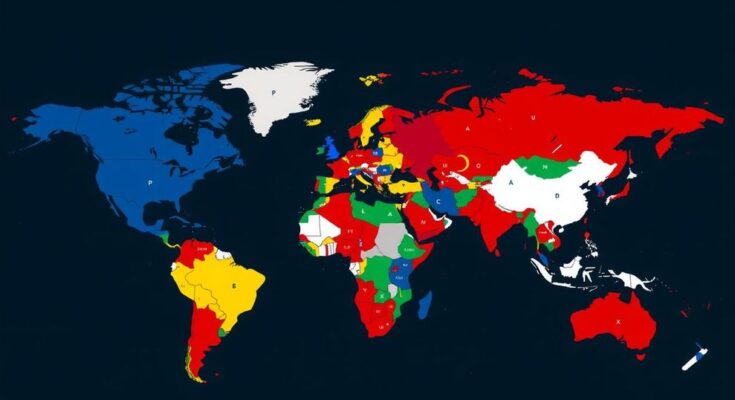In 2024, several nations faced political upheaval marked by coups and significant unrest, affecting countries like Bangladesh, Syria, Myanmar, and Haiti. The protests in Bangladesh led to a regime change and violence against minorities, while Syria saw an offensive from Islamist rebels and Myanmar continued its civil war post-coup. Haiti struggled with rampant gang violence, highlighting a broader trend of instability impacting regional security.
In 2024, numerous countries experienced significant political upheaval, primarily evidenced by attempts to overthrow governing regimes through military and political means. Nations such as Bangladesh, Syria, Myanmar, and Haiti faced severe unrest, exposing the vulnerabilities inherent in their political systems. The struggles for power not only ravaged these nations but also disrupted the stability of neighboring countries, showcasing a widespread pattern of political instability across the globe.
In Bangladesh, a series of student-led protests against Prime Minister Sheikh Hasina’s controversial quota reforms ignited widespread violence, ultimately leading to her flight from the country. The protests, which claimed thousands of lives, were followed by reprisals against minority communities, particularly Hindus. This turmoil has soured diplomatic relations with India, which expressed concern over the treatment of minorities amidst the ongoing unrest.
Syria has witnessed Islamic forces tightening their grip through a recent offensive in the north, culminating in the seizure of Aleppo. Rebel factions, primarily Hayat Tahrir al-Sham, have exploited the government’s retreat from several positions. Although the Syrian government retains control over significant regions, its precarious position reflects the ongoing conflict’s deep entrenchment and the multifaceted dynamics at play.
Myanmar remains embroiled in civil war following the military coup that ousted Aung San Suu Kyi’s government. The violence has resulted in thousands of fatalities and the displacement of millions, highlighting the catastrophic ramifications of the junta’s actions. Despite some rebel groups expressing willingness for peace dialogues, the situation remains volatile.
Haiti is grappling with rampant gang violence fueled by a power vacuum following attempts to unseat Prime Minister Ariel Henry. Control of Port-au-Prince by armed groups has escalated dramatically, with reports of thousands of casualties and mass displacements, particularly affecting women and children, revealing a dire humanitarian crisis in the wake of political collapse.
The political landscape in several nations has suffered severely due to multiple coups and uprisings throughout 2024. These events underscore the fragile nature of political systems in countries like Bangladesh and Syria, where public discontent has led to violent outbreaks and regime changes. In contexts such as Haiti, the absence of stable governance has propelled gang violence, exacerbating humanitarian crises. The international community’s reactions to these developments further signal a growing concern over the protection of minorities and political stability in these regions.
In conclusion, the events of 2024 have illuminated the precarious state of governance in numerous nations around the world. From Bangladesh’s tumultuous protests and subsequent violence against minorities, to Syria’s ongoing conflict and Haiti’s catastrophic gang rule, each situation reflects a broad pattern of instability that not only affects the nations in question but also poses implications for regional security and humanitarian conditions. The international response will be crucial in addressing these complex issues and restoring peace and stability.
Original Source: www.news18.com




